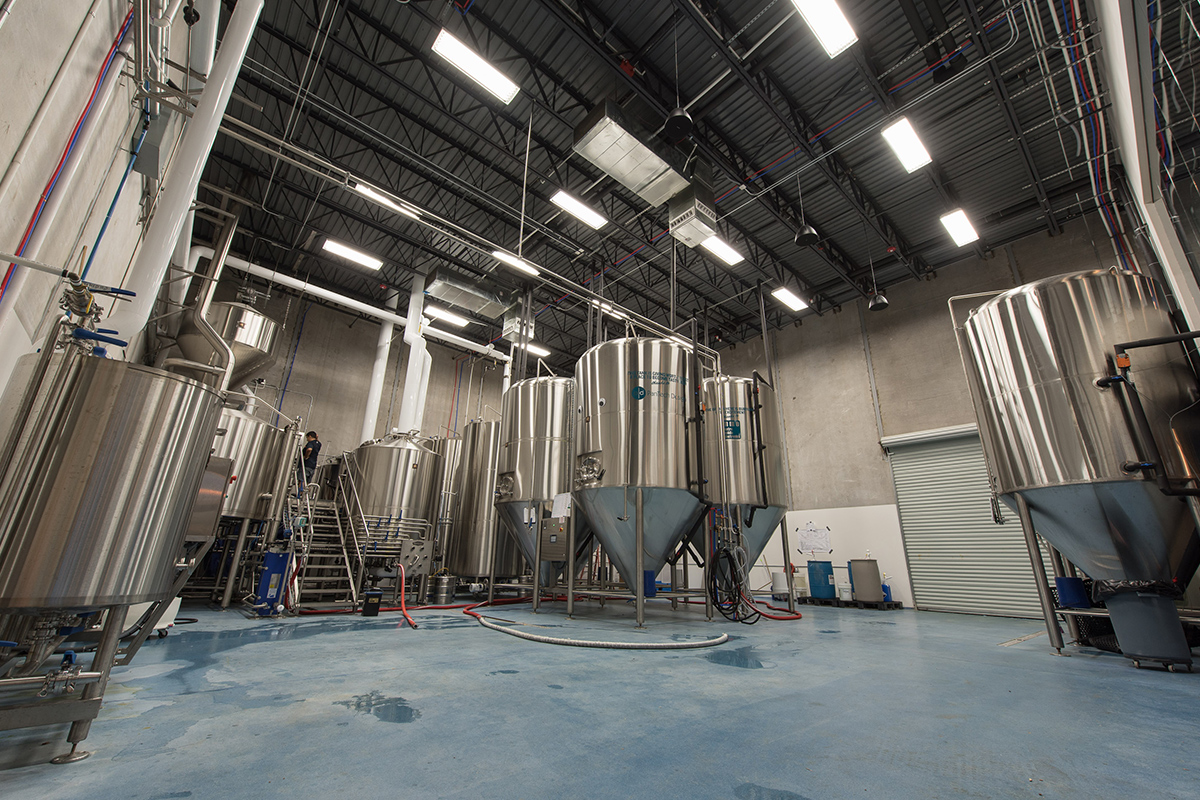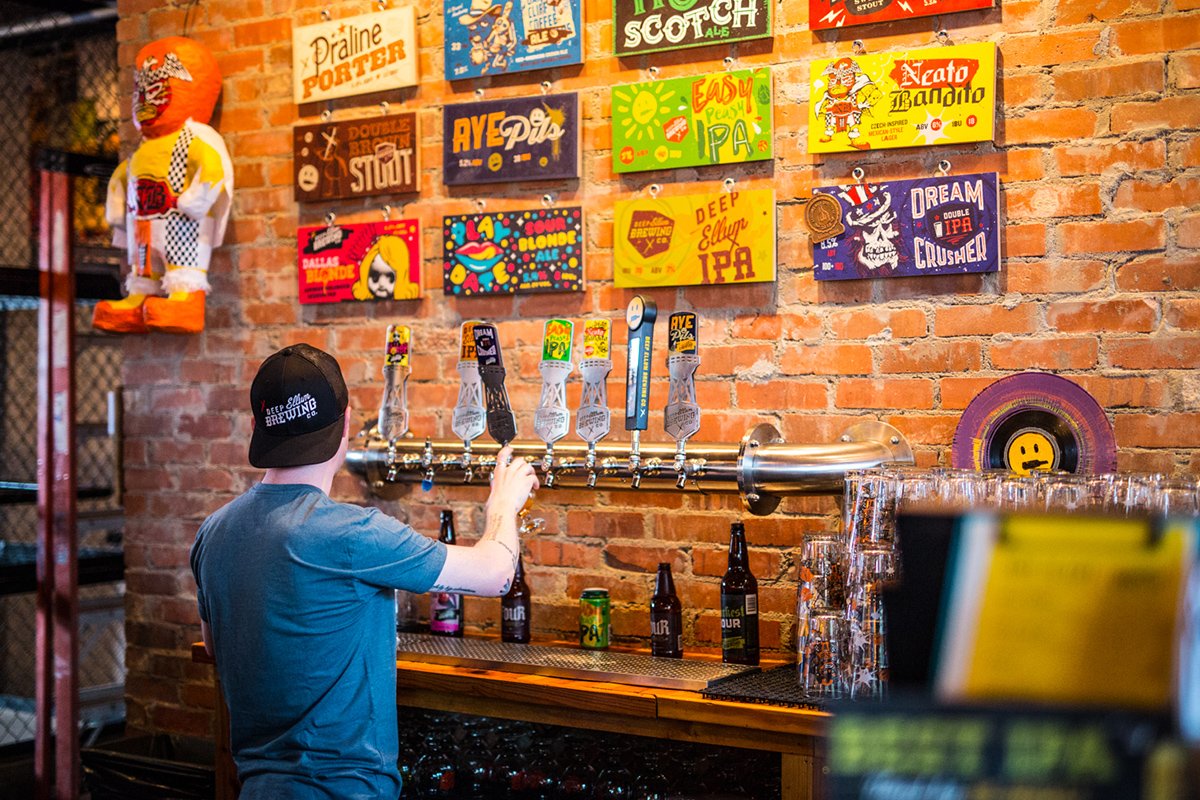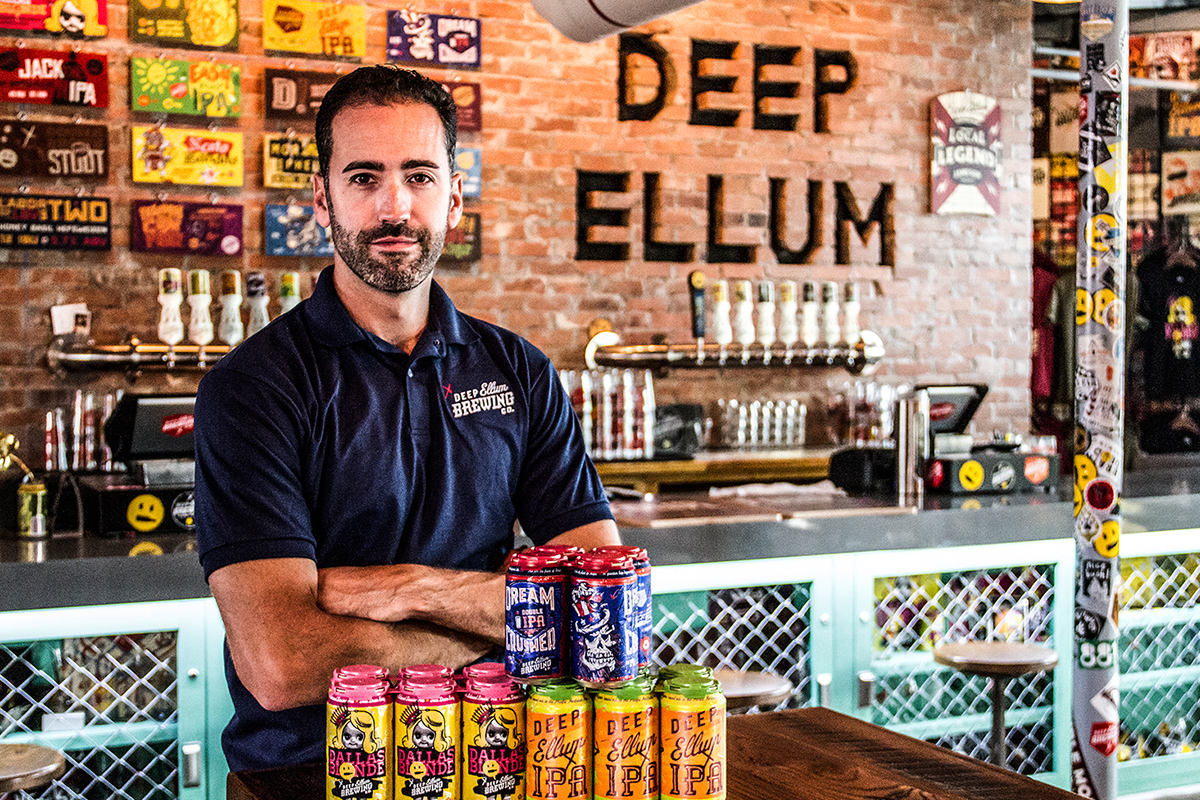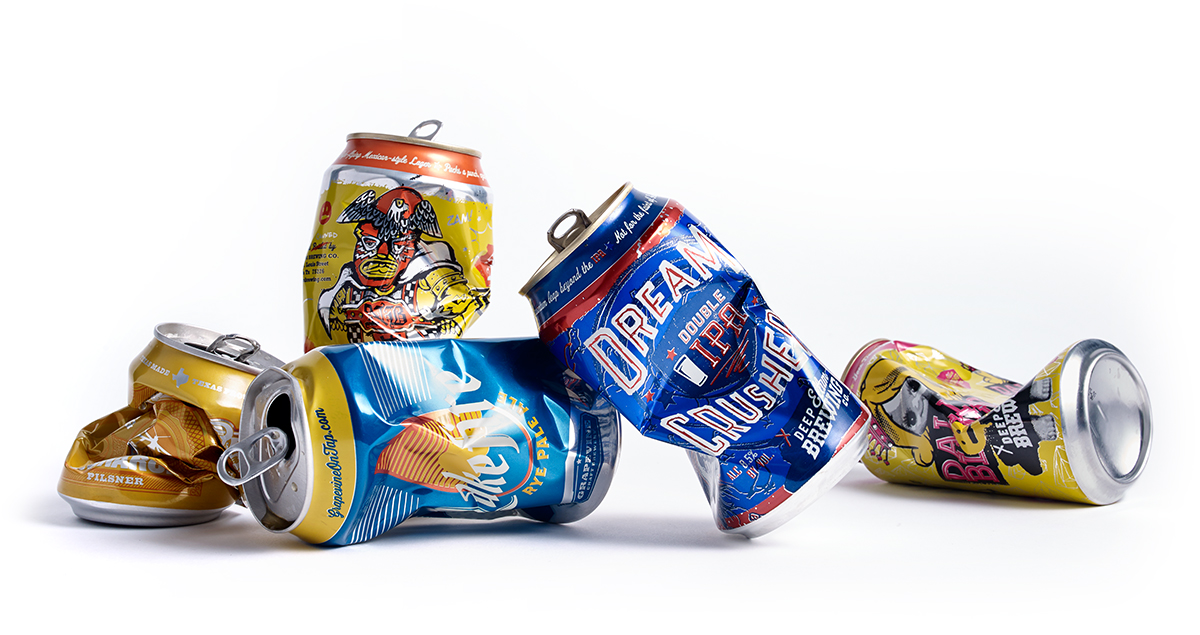Gary Humble, the founder and CEO of Grapevine Craft Brewery, operates his three-year-old business out of a gleaming, $3.8 million facility a few blocks from historic downtown Grapevine. The brewery’s location just off heavily trafficked South Main Street is no accident. The taproom at Grapevine Craft Brewery, which has 25 employees and will produce 11,000 barrels of beer this year, is a popular destination for “beer tourists” seeking to sample the brewery’s unique offerings, like Sir William’s English Brown Ale and Lakefire Rye Pale Ale.

The provision has so angered Humble that he and Dallas brewer John Reardon, the founder of Deep Ellum Brewing Co., have filed a lawsuit against the Texas Alcoholic Beverage Commission in U.S. District Court to overturn the statute. Reardon and Humble claim the alcohol beverage code’s “arbitrary,” differential treatment of craft brewers violates the U.S. Constitution, hamstrings their ability to compete, and harms consumers. If the provision were eliminated, “our business would increase from day one by 50 percent on the retail side in our taproom, because we refuse those sales multiple times every day of the week,” says Humble, who declines to disclose his company’s annual revenue. “At the end of the day, it angers me that we make a great product, but the law doesn’t allow us to sell it. How un-American is that?”
Reardon, whose four-year-old, 16,000-square-foot craft brewery and tasting room on St. Louis Street offers beers like Dallas Blonde and Deep Ellum IPA, agrees with Humble. “I don’t think people understand how many people come to Dallas to visit our breweries,” he says. “Beer tourism is big in Texas, and the state … is losing a lot of tax revenue” because of the statute.
Craft brewers like Grapevine Craft and Deep Ellum, whose more than 40 employees helped produce 23,000 barrels of beer last year, compare their situation to that of another industry “disruptor”: electric-car manufacturer Tesla, whose efforts to sell directly to Texas consumers have been thwarted for several years by established automobile dealerships. At a time when craft brewing and brewers are increasingly popular—in North Texas alone, there are now at least 30 of the small, local, independent operations that use simple, traditional ingredients—the outcome of this brewing controversy could answer two important questions: How does a state that’s justifiably proud of its pro-business credentials accommodate fledgling companies operating in new and possibly disruptive ways? Or will it even try?
•••

In Texas, the association says, there are 189 craft breweries—ranking the state seventh nationally—with an economic impact in 2014 of $3.77 billion (third behind California and Pennsylvania). And according to Charles Vallhonrat, executive director of the Texas Craft Brewers Guild, 50 to 60 more Texas craft breweries are in the planning stages. Eight years ago, in contrast, the guild says there were just 35 licensed craft brewers in the state. By 2020, Vallhonrat’s group has estimated the segment’s economic impact in Texas could hit $5.6 billion annually.
But that will only be possible, the guild and others argue, if state law enables the segment to flourish. In contrast to craft beer-friendly states like Oregon and California, advocates contend, Texas craft brewers have been stifled by convoluted state laws favoring “big beer”-distributor interests—the outfits that deliver top-selling, volume brews like Bud Lite, Miller Lite, Coors Lite, and Budweiser. As a result, craft brewers here have waged a years-long battle in the state Legislature to make Texas law more hospitable to their fledgling industry.
The brewers’ complaints have focused on Texas’ interpretation of the alcoholic beverage industry’s so-called “three-tier distribution system,” which licenses and separately controls the production, distribution, and sale of beverages like beer, wine, and hard liquor. The three-tier system, which is regulated by the TABC, was adopted after the repeal of Prohibition in 1933, ostensibly to ensure the proper collection of taxes and to prevent any single entity from monopolizing the entire supply chain.
The system’s first tier involves the manufacturers or suppliers of the beverages. They sell their products to wholesalers or distributors—the second tier. These “middlemen” then sell the beverages to retailers like bars, grocers, restaurants, and liquor stores—the third tier—which, in turn, sell to consumers. More than 30 states, including Texas, follow this 83-year-old model.
Many applaud the three-tier system, saying it’s worked for decades to prevent monopolies and illegal, unsafe manufacturing. But critics argue that the system makes alcoholic beverages more expensive—taxes are imposed at each tier—and that it favors existing, entrenched industry players over newer ones.
Consider the situation in Texas with beer, for example, the focus of the craft brewers’ current fight. Under the state’s incredibly complicated rules, several separate types of licensed beer producers are allowed: holders of manufacturer’s licenses and brewer’s permits, and holders of brewpub licenses.
The holder of a manufacturer’s license is allowed to make beer for sale to licensed distributors and to “dispense beer for consumption on the premises,” but it may not sell beer on-site for off-premises consumption. Brewer’s permit licensees may dispense ale and malt liquor on the premises and sell ale on-site, but they, like manufacturer’s licensees, cannot sell ale or malt liquor on-site for off-premises consumption. On the other hand, holders of a brewpub license can, if located in a wet area, sell or give away ale, beer, or malt liquor—and, in addition, may sell on-site for off-premises consumption.
To further complicate things, under Texas law any producer of ale or malt beverages with more than 4 percent alcohol by weight must hold a brewer’s permit, and any producer of malt beverages with less than 4 percent alcohol by weight must hold a manufacturer’s license. (Deep Ellum Brewing holds a brewer’s permit, while Grapevine Craft Brewery has both a brewer’s permit and a manufacturer’s license.) The regulations further state that brewpub licenses are only available to beer producers if they make no more than 10,000 barrels of malt liquor, ale, and beer annually, and that a brewpub licensee cannot also be a manufacturer or brewer. And, just in case your head isn’t spinning already over these distinctions, the rules further stipulate that—unlike beer manufacturers and brewers—Texas wineries and liquor distilleries are allowed, like brewpubs, to sell their products (wine and spirits) to consumers for off-premises consumption.
In their lawsuit, Reardon and Humble, the local craft brewers, argue that such convoluted regulations create “irrational and arbitrary distinctions” between themselves and other producers of alcoholic beverages, violating the U.S. Constitution. They also charge that the rules have been deliberately “subverted by the economic interests of the entities” they were intended to regulate, citing a position paper on the topic prepared by Austin attorney Howard Wolf, a former member of the Texas Sunset Advisory Commission.
“The system currently used to regulate alcoholic beverages in Texas now promotes and protects private, rather than public, welfare,” Wolf wrote. “This is because the system has failed to adapt to … legal, social, and commercial changes … While the private interests of the commercial entities in the industry are artificially protected from the challenges of dealing with changes in the marketplace, there is no noticeable advancement of the public welfare. Even worse, in many instances, the public interests are either neglected or ignored. This disconnect to the environment in which the authority operates, corrupts the entire regulatory system.”
Concluded Wolf in his paper: “Now, the legalized system operates primarily to prevent competition, protect anti-competitive conduct, and otherwise thwart the functioning of a free market in the manufacture, distribution, and sale of alcoholic beverages.”
•••

In recent years, the two sides often have locked horns over amending the state’s alcoholic beverage code, with the craft brewers winning some fights and losing others. During the 2007 session of the Texas Legislature, for example, a bill died in the House that would have allowed breweries producing fewer than 75,000 barrels annually to sell beer to consumers for on-premises consumption, and in packaged form for consumption off-site. During the 2013 session, on the other hand, breweries producing up to 225,000 barrels annually won the right to sell as many as 5,000 barrels to consumers for on-premises consumption. (As a result of this new law, taprooms were opened for the first time in many Texas breweries.) In addition, holders of brewpub licenses producing as many as 10,000 barrels a year—up from the previous 5,000-barrel limit—were granted permission to sell packaged products to consumers for off-site consumption, to sell to distributors, and to sell as many as 1,000 barrels directly to retailers. During the 2015 legislative session, however, breweries once again were stymied in their effort to sell their product on-site for off-premises consumption—the issue that Deep Ellum and Grapevine are now pursuing in court.
The Wholesale Beer Distributors of Texas, a 78-year-old trade association that represents the state’s licensed beer distributors, makes no bones about its opposition to craft brewers selling beer for off-site consumption. The main reason, says Tom Spilman, the group’s executive vice president, is the integrity of the three-tier distribution system, which has “worked extremely well and allows everyone” equal access to the market.
The three-tier system “was created … so that you pick what you want to go into. You either make it, distribute it, or sell retail,” Spilman says. “There hadn’t been any ‘bastardization’ of the system until three years ago. In the 83rd Legislature, all the stakeholders got together and worked on several bills. At the end of the day, the Legislature chose not to allow that type of sale by manufacturers. We believe that was the right thing to do.
“If you start allowing producers to sell retail, it’s hurting other retailers: the 7-Elevens, the mom and pops, the independent package stores,” Spilman goes on. “If you take away ‘sales’ from the traditional three-tier system, then you turn it into a ‘tied-house’ system, where they’re allowed to make it and sell it, all in one.”
Rick Donley, president of the Beer Alliance of Texas, another major statewide distributor group, declined to comment on the issue because the lawsuit is pending.
•••

According to the National Institute on Money in State Politics—a nonprofit that tracks campaign finance data—beer, wine, and liquor interests gave at least $3.99 million to Texas political candidates during the 2014 election cycle. (The oil and gas industry, by comparison, donated $23 million, the nonprofit reported.) The segment’s top givers during the cycle, the institute says, included Barry G. Andrews, CEO of Dallas-based Andrews Distributing ($589,849); the Wholesale Beer Distributors of Texas ($450,764); the Beer Alliance of Texas ($253,363); and Dallas-based distributor Glazer’s Inc. ($61,000). Over 18 years Andrews has donated at least $2.13 million to Texas candidates, the nonprofit reports, while the Wholesale Beer Distributors has given $3.31 million over 20 years, the Beer Alliance has contributed $1.53 million over 16 years, and Glazer’s has ponied up $329,402 over a decade.
Spilman, of the Wholesale Beer Distributors, says the nonprofit’s total for his group puts it on “the lower end of the contribution scale,” compared to giving by members of other Texas industries. Even so, he insists, “I don’t think the money part plays into it. We’re out there advocating for our clients. Every industry known to man has lobbying. I don’t think money will influence members of the Legislature. I think it’s insulting [to] say that. This is a part of democracy.”
It’s hard to tell exactly how much money is at stake for the craft brewers. Reardon of Deep Ellum Brewing, who predicts his revenue will top $10 million this year, believes that on-site sales for off-premises consumption could account for 10 percent of a typical brewery’s total sales. Although beer produced by both Deep Ellum and Grapevine Craft is available statewide in bars, restaurants, and package and liquor stores, selling beer directly to consumers on-site for off-premises consumption is an especially “high-margin endeavor” for them, Vallhonrat of the Texas Craft Brewers group says.
Stewart, the lawyer representing Deep Ellum Brewing and Grapevine Craft Brewery, says the lawsuit (filed last October in U.S. District Court for the Western District of Texas, Austin Division) asserts that provisions barring on-site sales for off-premises consumption should be declared unconstitutional because they violate his clients’ equal protection and due process rights. A trial date has been set for early November, but Stewart expects both sides to move for a summary judgment in August. (A lawyer for the TABC did not respond to emailed requests for comment for this article. But in their December answer to the original complaint, attorneys for the state agency denied, among other things, that the code has fostered “economic protectionism” or has created arbitrary distinctions between different producers.)
Meantime, Reardon sat in Deep Ellum Brewery’s tasting room one recent morning, reflecting on the long struggle. When all is said and done, the plaintiffs will have spent as much as $400,000 on the lawsuit, he said. Deep Ellum raised almost $35,000 for the effort via a crowd-funding campaign called Operation Six Pack To Go. “I always knew I’d have to get political,” Reardon said. “But I never knew it would be so soon, and on such a grand scale.”
The scale is grand, indeed—and the state’s fledgling craft brewers insist that, for them, the stakes are high. Concludes one industry observer, who asked to remain anonymous: “The distributors are under siege now, and they know it. They’re fighting a rear-guard battle. They’re trying to hold on as long as they can.” We may find out soon how strong their grip is.








